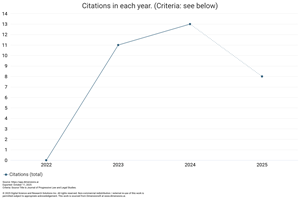Problem of Determining Past Income for Children in Court the Decisions
DOI:
https://doi.org/10.59653/jplls.v1i01.8Keywords:
Māḍiyah maintenance, children, religious courtAbstract
The data obtained were then analyzed using the content analysis method. Decision Religious shows that the legal basis for refusing claims for māḍiyah maintenance for children in divorce is legal considerations as considered by the Supreme Court in its decision rejecting lawsuits for past maintenance for children, namely that the father's obligation to provide for his child is lil-intifā’, not lit -tamlīk, then a person's negligence fathers who do not provide for their children cannot be sued. This leads to injustice because māḍiyah maintenance is not granted to children. This will certainly be detrimental to the life and welfare of the child, who in other circumstances can become a shield for a father who neglects to provide for his child. Māḍiyah's livelihood is a form of protection for the rights of divorced women and children born during a marriage. This is in line with the verses of the Koran and hadith which talk about the obligation of a father to his wife and children to provide maintenance.
Downloads
References
Alauddin, A. (2019). Analisis Yuridis Tanggung Jawab Ayah Kandung Terhadap Nafkah Anak Setelah Perceraian. Jurnal Al-Ahkam: Jurnal Hukum Pidana Islam, 1(1), 1–24. https://doi.org/10.47435/al-ahkam.v1i1.96
Devy, S., & Muliadi, D. (2020). Pertimbangan Hakim dalam Menetapkan Nafkah Anak Pasca Perceraian (Studi Putusan Hakim Nomor 0233/Pdt.G/2017/MS-MBO). El-USRAH: Jurnal Hukum Keluarga, 2(1). https://doi.org/10.22373/ujhk.v2i1.7646
Devy, S., & Suci, D. M. (2020). The implementation of verdict execution on providing Mađiyah maintenance following divorce according to islamic law (Case study in Syar’iyyah Court Banda Aceh). In Samarah (Vol. 4, Issue 2). https://doi.org/10.22373/sjhk.v4i2.6179
Fadri, K., Mukhlis, M., & Yusrizal, Y. (2020). KEWENANGAN PENGADILAN AGAMA DAN PENGADILAN TATA USAHA NEGARA TERHADAP PEMBEBANAN NAFKAH ANAK AKIBAT PERCERAIAN PEGAWAI NEGERI SIPIL. Suloh:Jurnal Fakultas Hukum Universitas Malikussaleh, 8(1). https://doi.org/10.29103/sjp.v8i1.2488
Iksan, & Adnan. (2020). Gugatan Konvensi Dan Rekonvensi Dalam Bingkai Syariat Islam (Analisis Putusan Nomor: 603/Pdt.G/2019/PA.Bm.). Fundamental: Jurnal Ilmiah Hukum, 9(2). https://doi.org/10.34304/fundamental.v1i2.21
Indonesia, K. A. R. (2013). Al-Qur’anulkarim Maqdis: Mushaf Al-Qur’an Tajwid dan Terjemah. Cordoba Internasional-Indonesia.
Jamaluddin, Nanda Amalia, & Laila M. Rasyid. (2015). WOMEN AND DIVORCE: LEGAL JUSTICE STUDY OF SOCIETAL AND JUDICIAL PERSPECTIVE TOWARD UNRECORDED DIVORCE IN ACEH, INDONESIA. US-China Law Review, 12(8). https://doi.org/10.17265/1548-6605/2015.08.002
Masrukhin, M., & Damayanti, M. (2020). Hukum Progresif Penanganan Hak Nafkah Anak dalam Kasus Perceraian di Pengadilan Agama (Studi di Pengadilan Agama Karesidenan Surakarta). Al-Ahkam Jurnal Ilmu Syari’ah Dan Hukum, 5(1). https://doi.org/10.22515/al-ahkam.v5i1.1794
Sujono, I. (2022). Legal Review of Marriage for Divorced Women Outside the Religious Courts. International Journal of Islamic Thought and Humanities, 1(1), 1–16. https://doi.org/10.54298/ijith.v1i1.10
Supriyadi, S. (2022). REKONSTRUKSI KEDUDUKAN ANAK AKIBAT PERKAWINAN SIRRI PASCA PUTUSAN MAHKAMAH KONSTITUSI DENGAN PENDEKATAN HUKUM PROGRESIF. Masalah-Masalah Hukum, 51(1). https://doi.org/10.14710/mmh.51.1.2022.29-39
Tinjauan Hukum Islam dan Hukum Positif terhadap Permohonan Nafkah Māḍiyah dalam Perkara Cerai Gugat (Studi Komperatif). (2020). Syaksia : Jurnal Hukum Perdata Islam, 20(1). https://doi.org/10.37035/syakhsia.v20i1.1983
Widyakso, R. (2018). EKSEKUSI NAFKAH PERCERAIAN DI PENGADILAN AGAMA KOTA MALANG. Ulumuddin, 11(1). https://doi.org/10.22219/ulum.v11i1.10409
Downloads
Published
How to Cite
Issue
Section
License
Copyright (c) 2023 Masnuah Lisa

This work is licensed under a Creative Commons Attribution-ShareAlike 4.0 International License.
Authors who publish with this journal agree to the following terms:
- Authors retain copyright and grant the journal right of first publication with the work simultaneously licensed under a Creative Commons Attribution-ShareAlike that allows others to share the work with an acknowledgement of the work's authorship and initial publication in this journal.
- Authors are able to enter into separate, additional contractual arrangements for the non-exclusive distribution of the journal's published version of the work (e.g., post it to an institutional repository or publish it in a book), with an acknowledgement of its initial publication in this journal.
- Authors are permitted and encouraged to post their work online (e.g., in institutional repositories or on their website) prior to and during the submission process, as it can lead to productive exchanges, as well as earlier and greater citation of published work (See The Effect of Open Access).
























